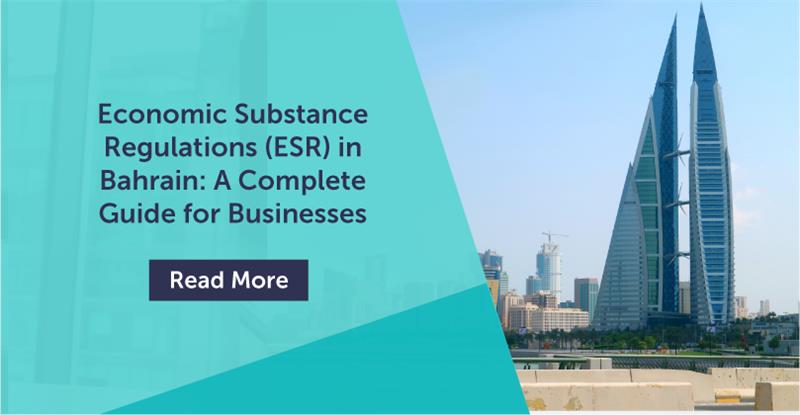- November 13, 2025
- Posted by: admin@ecabahrain
- Category: Audit, Others

Economic Substance Regulations (ESR) in Bahrain
Economic Substance Regulation (ESR) in Bahrain is an important compliance requirement for businesses registered in the Kingdom. Introduced in line with global standards set by the Organization for Economic Co-operation and Development (OECD), ESR ensures that companies genuinely operate in Bahrain rather than merely taking advantage of its favourable tax regime. Compliance not only protects businesses from penalties but also strengthens credibility, transparency, and long-term operational sustainability.
Why ESR Matters?
The primary purpose of ESR is to ensure that profits reported in Bahrain are supported by real business activities and genuine economic presence in the country. By implementing ESR, Bahrain demonstrates its commitment to global tax standards under the OECD’s Base Erosion and Profit Shifting (BEPS) framework.
Non-compliance can lead to severe consequences, including financial penalties up to BD 100,000 and even imprisonment. Moreover, businesses that fail to meet ESR obligations risk reputational damage and potential restrictions on future operations. ESR compliance is therefore essential for both legal protection and building trust with stakeholders, investors, and regulators.
Relevant Activities under ESR
Not all businesses operating in Bahrain are required to comply with ESR. Only companies engaged in specific “relevant activities” fall under its scope. These include:
For non-CBB licensed entities undertaking non-regulated activities:
- Distribution and Service Centre Business
- Headquarters Business
- Holding Company Business
- Lease Finance Business
- Shipping Business
- Intellectual Property Business
For CBB licensed entities undertaking regulated activities:
- Banking Business
- Financing Business
- Insurance Business
- Investment Fund Management Business
It is crucial for businesses to correctly identify whether their operations qualify as relevant activities. Misclassification is a common error that can lead to incorrect filings or non-compliance.
Applicability of ESR
ESR has been applicable in Bahrain since 1st January 2019 for certain financial institutions licensed by the Central Bank of Bahrain (CBB). For non-CBB entities:
- Traders applying for new commercial registrations must comply from 1st January 2019.
- Existing traders undertaking new relevant activities or acquiring new Intellectual Property (IP) assets must comply from 1st January 2019.
- All existing traders carrying out relevant activities have been subject to ESR since 1st July 2019.
Maintaining Records for ESR Compliance
To comply with ESR, businesses are required to maintain accurate books and records for six years from the end of the financial year in which the Information Notification is filed. These records should provide sufficient evidence to demonstrate that the business is carrying out core income-generating activities within Bahrain. Maintaining organized records ensures smoother compliance and reduces the risk of errors during audits or regulatory reviews.
ESR Compliance Criteria
To successfully meet ESR requirements, businesses should ensure the following:
- The relevant activity constitutes a “Core Income-Generating Activity” performed in Bahrain.
- Operations are adequately managed and directed from within Bahrain.
- An adequate number of qualified full-time employees are employed in the Kingdom.
- Sufficient operating expenditures and physical assets are maintained in Bahrain.
Meeting these criteria is essential for demonstrating genuine economic substance and avoiding penalties.
Common ESR Challenges and How to Address Them
Even well-established businesses can encounter challenges in complying with ESR:
- Misidentifying Relevant Activities: Companies often assume they are exempt or incorrectly classify their business activity. Careful review of ESR definitions and professional guidance helps avoid errors.
- Incomplete or Inaccurate Records: Missing contracts, unverified figures, or unclear documentation can trigger regulatory scrutiny. Keeping consistent, organized records throughout the year minimizes risks.
- Insufficient Local Presence: Failure to have adequate employees, office space, or expenditures in Bahrain may result in non-compliance. Businesses should plan their operations to meet substance requirements proactively.
How Emirates Chartered Accountants Group Bahrain Can Help?
Emirates Chartered Accountants Group Bahrain provides tailored support to businesses for seamless ESR compliance. Our approach includes:
- Conducting a preliminary check to determine ESR applicability for your business.
- Assessing whether your business meets the ESR criteria.
- Identifying gaps in compliance and providing actionable recommendations to meet regulations.
- Assisting in filing Information Notifications and reporting with relevant authorities.
With a team of experienced professionals, we understand that every business is unique. Our bespoke approach ensures that compliance is achieved efficiently, allowing you to focus on growing your business without regulatory concerns.
Final Thoughts
ESR compliance is not just about avoiding fines, it is about demonstrating that your business has genuine roots and operations in Bahrain. By understanding the requirements, avoiding common mistakes, and staying proactive, companies can turn ESR from a compliance burden into an opportunity for credibility and long-term success.
If you’re looking for personalized support, the experts at Emirates Chartered Accountants Group Bahrain are here to help.



